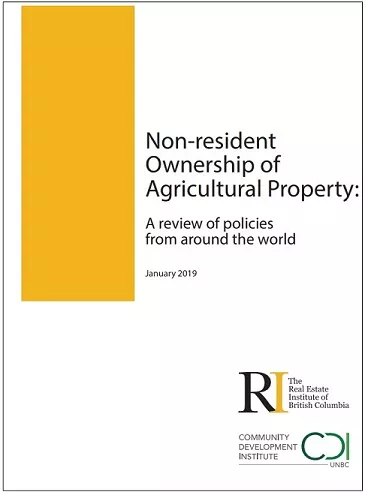Non-Resident Property Ownership in BC
Community Services Provision, Community and Economic Development and Transformation, Major Project Development

As a result of ongoing interest in, and concerns about, non-resident property ownership in BC, the Real Estate Institute of BC (REIBC) approached the CDI to conduct three research studies in order to inform dialogue and policy development. The studies are a comparative review of policies and approaches from jurisdictions around the world aimed at limiting non-resident ownership of residential, commercial and industrial, and agricultural land.
- A worldwide concern in recent years has been “land grabbing,” the large-scale acquisition of land by private or public investors, including foreign nationals and foreign governments. A 2015 Library of Parliament publication holds that “In Canada, concerns about farmland grabbing relate to actions by domestic, as well as foreign, investors … the threat of farmland acquisition comes not only from abroad, but also from within Canada via such instruments as investment funds.”2 The consequences include the increasing price of farmland, making farming less financially viable for future generations of farmers.
Non-resident Ownership of Agricultural Property
- In 2016, the Province of British Columbia legislated a 15% property transfer tax to be applied to foreign nationals and foreign-controlled corporations purchasing residential properties in Metro Vancouver. This was in response to increasing concerns over housing affordability due to data on housing sales that showed foreign nationals invested more than $1 billion in BC property between June 10 and July 16, 2016. Since that time, there appears to have been a surge in the sale of commercial real estate in British Columbia and Metro Vancouver. In March 2017, the Real Estate Board of Greater Vancouver reported a 47% increase in the value of commercial real estate in 2016.
Non-resident Ownership of Commercial and Industrial Property
- Housing affordability was a leading issue of concern in 2016 throughout British Columbia. The skyrocketing house prices in Metro Vancouver figured prominently in the media. However, Fort St. John, Kitimat, and Terrace have all seen double-digit increases in their average residential selling prices in recent years. As a result, policy makers, planners, and real estate professionals across the province are grappling to understand the drivers behind the increases and design solutions that will effectively stabilize the real estate market and increase housing affordability for local residents without affecting a plunge in equity values or driving away foreign investment.